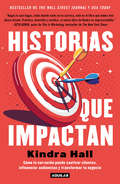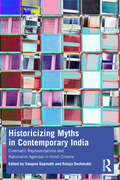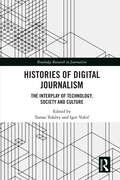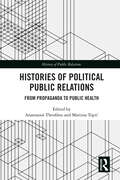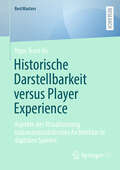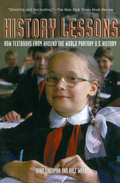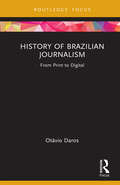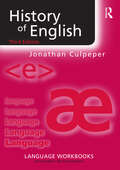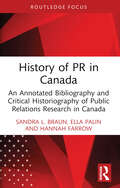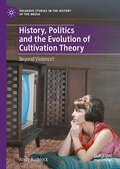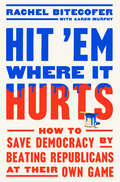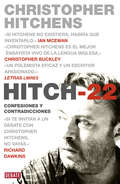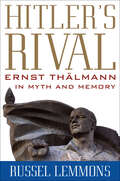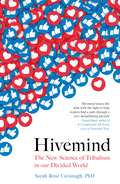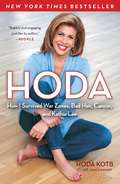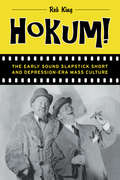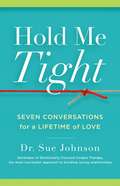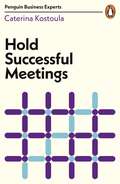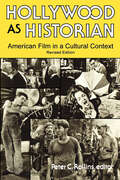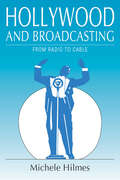- Table View
- List View
Historias que impactan: Cómo la narración puede cautivar clientes, influenciar audiencias y transformar
by Kindra HillEn el momento en que tomas el control de tus historias, tomas el control de tu negocio y de tu vida. "Hagas lo que hagas, estés donde estés en tu carrera, este es el libro que debes leer ahora mismo. Práctico, divertido y verídico, el nuevo libro de Kindra es imprescindible." -SETH GODIN, autor de This Is Marketing, bestseller de The New York Times Seguramente has escuchado que las historias son la mejor herramienta de negocios y que la narración de las mismas puede hacerlo todo, desde ayudar a los líderes a comunicarse mejor hasta motivar a los equipos de ventas y ganar clientes de la competencia. ¿Pero cuáles necesitas contar? ¿Y cómo hacerlo? En este libro, Kindra Hall, una reconocida narradora profesional y oradora, revela las cuatro historias únicas que puedes usar para diferenciar, cautivar y elevar: -La historia del valor: para convencer a los clientes de que necesitan lo que tú ofreces. -La historia de la fundación: para persuadir a los inversores y clientes de que vale la pena invertir en tu organización. -La historia del propósito: para alinear e inspirar a tus empleados y clientes internos. -La historia del consumidor: para permitir que aquellos que utilizan tu producto o servicio compartan tus experiencias auténticas con otros. Contarlas bien es una habilidad simple y accesible que cualquiera puede desarrollar. Con estudios de casos, perfiles de empresas y anécdotas respaldados por investigaciones, Kindra ofrece pasos específicos y accionables que puedes tomar para encontrar, crear y aprovechar las historias que ya tienes y que simplemente no estás contando.
Historicizing Myths in Contemporary India: Cinematic Representations and Nationalist Agendas in Hindi Cinema
by Swapna Gopinath Rutuja DeshmukhThis book examines cinematic practices in Bollywood as narratives that assist in shaping the imagination of the age, especially in contemporary India. It examines historical films released in India since the new millennium and analyses cinema as a reflection of the changing socio-political and economic conditions at any given period. The chapters in Historicizing Myths in Contemporary India: Cinematic Representations and Nationalist Agendas in Hindi Cinemas also illuminate different perspectives on how cinematic historical representations follow political patterns and market compulsions, giving precedence to a certain past over the other, creating a narrative suited for the dominant narrative of the present. From Mughal-e-Azam to Padmaavat, and Bajirao Mastani to Raazi, the chapters show how creating history out of myths validate hegemonic identities in a rapidly evolving Indian society. The volume will be of interest to scholars of film and media studies, literature and culture studies, and South Asian studies.
Histories of Digital Journalism: The Interplay of Technology, Society and Culture (Routledge Research in Journalism)
by Tamas Tofalvy Igor VobičBuilding on the momentum of the recent “historical turn” in digital media and Internet studies, this volume explores how digital journalism has developed from a historical perspective. With contributions from established and emerging scholars from Europe, Asia, South and North America, the book investigates not only how established journalistic systems transformed in the early days of digital but how the structural, technological, and cultural changes induced by digitization have reconfigured the trajectory of journalism.The book argues in support of three main claims. The first is that emphasis should be given to the plurality of histories instead of one single digital journalism history, thereby acknowledging the complexities, interactions of social relations, cultural traditions, power configurations, and technological changes that have shaped journalism and digitization. The second is the decentralization and decolonization of digital journalism histories. The third refers to the need to highlight and demonstrate the idea that the evolution of digital journalism should be viewed as the co-construction of the social and technological realms.With theoretical and methodological reflections on historicizing digital journalism along with original case studies or comparative inquiries into the phenomena over the decades-long digital revolution of journalism, this volume will shape the nascent field of digital journalism history and start a global critical exchange of various approaches to and aspects of historicizing digital journalism. As such, it will interest scholars and students of digital journalism, journalism history, digital media, Internet studies, and technology studies.
Histories of Political Public Relations: From Propaganda to Public Health (The History of Public Relations)
by Anastasios Theofilou Martina TopićDespite strong arguments that have been exploring the influence of Public Relations (PR) on public information, propaganda, the development of nation branding and policy-making, there remains little research on the history of governmental PR. This has led to a limited understanding of the discipline that aligns it with a supportive role to wider marketing campaigns or with a stretch to political communication through lobbying.Responding to this challenge, this book explores PR’s historical connection to government communication. The editors assemble respected contributors to explore government PR through a series of micro-histories and also examine larger theoretical issues, including the relationship between PR and propaganda. The chapters explore behavioural aspects of government campaigning and the tools and techniques typically used. In the context of COVID-19 and global resistance to measures, while health and climate scientists warn that there might be more pandemics to come, looking at behavioural campaigning becomes even more relevant.This book will add knowledge and understanding to the fields of PR history and historiography. Academics and researchers will find the volume appropriate for research and teaching.
Historische Darstellbarkeit versus Player Experience: Aspekte der Visualisierung nationalsozialistischer Architektur in digitalen Spielen (BestMasters)
by Ngoc Tram VuUnterhaltungsspiele, die im Zusammenhang mit der Handlung und Folge des Zweiten Weltkriegs stehen sowie eine zeitgenössische Aufarbeitung der Verbrechen des Nationalsozialismus veranschaulichen, nutzen häufig narrative und emotionale Elemente zur historischen Inszenierung. Die Darstellung und Rekonstruktion nationalsozialistischer Architektur wurde jedoch in der Forschung zu digitalen Spielen bislang kaum beachtet. Mit diesem Hintergrund untersucht diese Arbeit die visuelle Adaption der NS-Architektur in Gaming-Medien aus unterschiedlichen Jahrzehnten. Die Architektur in digitalen Spielen bildet eine hybride Form, die Fragmente historischer Bauten mit fiktionalen, oft „deutsch-faschistisch“ wahrgenommenen Formen kombiniert. Bestimmte visuelle Anpassungen werden zudem aus Spielmechanik- und Spielerfahrungsgründen neu gestaltet. Die große Diskrepanz zwischen historischen Vorbildern und fiktionalen Interpretationen schafft ein eigenes Genre der Bildsprache, das neue Forschungsansätze für die Architekturgeschichte bietet, aber auch Bedenken bezüglich der möglichen Verharmlosung der NS-Geschichte im heutigen digitalen Zeitalter weckt.
History Alive! Pursuing American Ideals
by Diane HartBy using this program, the students will discover how the skills of social sciences are used to explore the history of the United States. The print and online components of this program provide the tools needed for a complete learning cycle. Each unit begins with an online Unit Opener to prepare for inquiry--asking questions and proposing supported answers and solutions. Each lesson with a Lesson Guide preview activity that engages inquiry and sets a foundation for the lesson's content. In the Lesson Guide, student will participate in an interactive activity that connects to both the C3 Framework and English Language Arts and literacy. In these activities, they will use the tools of social studies inquiry: asking questions, using sources and other evidence to develop claims, and communicating conclusions. The lesson concludes as the readers demonstrate their knowledge of the lesson's core ideas and the inquiry process through a variety of paper and online Assessments.
History Lessons: How Textbooks from Around the World Portray U.S. History
by Dana Lindaman Kyle WardA &“fascinating&” look at what students in Russia, France, Iran, and other nations are taught about America (The New York Times Book Review). This &“timely and important&” book (History News Network) gives us a glimpse into classrooms across the globe, where opinions about the United States are first formed. History Lessons includes selections from textbooks and teaching materials used in Russia, France, Iran, Saudi Arabia, Cuba, Canada, and others, covering such events as the American Revolution, the Cuban Missile Crisis, the Iran hostage crisis, and the Korean War—providing some alternative viewpoints on the history of the United States from the time of the Viking explorers to the post-Cold War era. By juxtaposing starkly contrasting versions of the historical events we take for granted, History Lessons affords us a sometimes hilarious, often sobering look at what the world thinks about America&’s past. &“A brilliant idea.&” —Foreign Affairs
History in the Making: The Story of the American Printing House for the Blind 1858-2008
by Carol Brenner TobeThis beautifully illustrated 150th Anniversary book celebrates the history of the American Printing House for the Blind (which is based in Louisville, Kentucky) and examines its mission to provide specialized materials, books, products, and services to the visually impaired. Author Carol Tobe guides the reader through all of the Printing House's mechanical innovations and evolutions right up to today's digital solutions. Hundreds of color photographs showcase the Printing House, its people, and machines of the past and present. Its story is virtually the story of blind people in America.
History of Brazilian Journalism: From Print to Digital (Routledge Focus on Communication and Society)
by Otávio DarosThis book constitutes a first-of-its-kind synthesis of the development of journalism in Brazil, considering both its mediations with national social and political life and its relationships of influence and dependence on international economic centers. The author suggests that Brazilian journalism has so far known four phases: doctrinal political journalism, narrative literary journalism, industrial news journalism, and multimedia infotainment journalism. Devoting a chapter to each phase, Daros presents a critical map of the genesis and metamorphosis of journalistic practices in the country. The analysis goes beyond a mere study of national history to mark the points of connection between the Brazilian case and other geographic spaces, showing how the profession moved between two Western paradigms and was continually shaped by the economic, political, and cultural context from which it emerged and was inserted. The final part of the book reflects critically on the state of Brazilian journalism today, considering the new social media culture, the increasing focus on costs over quality of news products, and the failed social responsibility of the profession to inform national public opinion. This study is an important touchstone for researchers of Brazilian and Latin American journalism and those interested in the ways in which the media shapes and is shaped by a country’s socio-political climate.
History of English (Language Workbooks)
by Jonathan CulpeperRoutledge Language Workbooks provide absolute beginners with practical introductions to core areas of language study. Books in the series provide comprehensive coverage of the area as well as a basis for further investigation. Each Language Workbook guides the reader through the subject using ‘hands-on’ language analysis, equipping them with the basic analytical skills needed to handle a wide range of data. Written in a clear and simple style, with all technical concepts fully explained, Language Workbooks can be used for independent study or as part of a taught class. History of English: • examines the history of the English language in order to explain the English that is used today • introduces key linguistic concepts • provides ‘discussion points’ to generate debate • encourages readers to think critically about the subject • involves readers in collecting and analysing their own data • contains a ‘mini-corpus’ of texts, used for exercises and to illustrate points raised in the commentary Revised throughout, this updated edition integrates the latest research on the history of English, including an additional chapter on English letters and punctuation, and an updated bibliography. History of English, 3rd edition provides an essential introduction and workbook for students coming to this subject for the first time.
History of PR in Canada: An Annotated Bibliography and Critical Historiography of Public Relations Research in Canada (The History of Public Relations)
by Sandra L. Braun Ella Palin Hannah FarrowA first of its kind, this annotated bibliography provides an overview of the development of public relations research in the Canadian context. A valuable resource for researchers, students or practitioners, this bibliography surveys the landscape of public relations research in Canada. It orientates readers to this unique history, identifies gaps in research, suggests topics of future research, and offers critical historiography.This reference work will be of interest to scholars, students and practitioners in the fields of strategic communications, marketing or communications, providing a greater understanding of communications research in various Canadian contexts such as government, industry, corporate and nonprofit.
History, Politics and the Evolution of Cultivation Theory: Beyond Violence? (Palgrave Studies in the History of the Media)
by Andy RuddockThis book provides a cultural history of cultivation theory, a North American mass communication paradigm best known for arguing that television violence was a potent agent of political socialisation. Decades after its inception, cultivation theory remains an evocative force in imagining twenty-first-century media power. This book reveals how many factors shaped the theory: the spectre of twentieth-century fascism, the Cold War, political turbulence in 1960s America, and the realisation that television had profoundly altered the rhythms of social and political life. The book also explains how cultivation theory became a means of analysing diverse media influences, thanks to various scholars who brought different motivations, perspectives and skills to the project. Cultivation theory succeeded because its practitioners related their work to the changing political moods of post-war America. In doing so, they created a unique critical perspective within mass communication research, which continues to shed light on the role media play in political conflict.
Hit 'Em Where It Hurts: How to Save Democracy by Beating Republicans at Their Own Game
by Rachel BitecoferA radical, urgent plan for how the Democratic Party and its supporters can win elections at one of the most pivotal moments in the history of our nation&’s democracy&“Bitecofer hits hard against the GOP tactics of fear and anger and the Democrats&’ status quo narratives around political engagement and winning elections.&”—Michael Steele, former RNC chairWhy do Democrats fail to win voters to their side, and what can they do to develop new winning political strategies—especially as the very fate of democracy hangs in the balance in 2024? Too often the carefully constructed, rational arguments of the Left meet a grisly fate at the polls, where voters are instead swayed by Republican candidates hawking anger, fear, and resentment. Only when Democrats are handed an overwhelming motivational issue—like the Supreme Court&’s 2022 Dobbs decision overturning Roe v. Wade—have they found a way to counter this effect.Political scientist and strategist Rachel Bitecofer came to prominence after predicting the size (to the seat) of the Democrats&’ rare Blue Wave in the 2018 midterms. At the heart of her prediction lay a powerful concept—negative partisanship, or the idea that voters, even most so-called independents, don&’t vote for their candidate so much as they vote against their candidate&’s opponent. Seen through this lens, Hit &’Em Where It Hurts is a deep dive into the Republicans&’ own playbook, sharing how Democrats can turn the Right&’s own tactics against them. The way for Democrats to wage—and win—electoral war, Bitecofer writes, is to present themselves as &“brand ambassadors for freedom, health, wealth, safety, and common sense,&” the very opposite of the extremist, freedom-fearing Right. This is a last-ditch effort to armor democracy while there is still time to save and strengthen it against hijacking by a small minority of ideologues.As America careens into the election cycle that will determine its democratic future, Hit &’Em Where It Hurts is the book for any Democrat who has ever banged their head against a wall when obvious reasoning failed to sway voters over to their side. This guide is a lifeline to save American democracy in its darkest hour.
Hitch-22
by Christopher HitchensEn Hitch 22, sus esperadas memorias, Christopher Hitchens, el escritor politico por excelencia, repasa su vida hasta la actualidad, desde su infancia en Portsmouth con una madre que le adoraba, de destino trágico, y un padre reservado y distante; hasta su vida en Washington DC, desde donde ha escrito contra todo tipo de tiranías. En el camino recuerda los amigos, las batallas y las botellas, las grandes luchas y las causas perdidas, y los errores y las dudas que han definido su vida.Hitch 22 es un libro por turnos conmovedor, gracioso, delicioso, enfurecedor e inspirador. Un complemento indispensable a la vida y la obra de un intelectual fundamental de los últimos treinta años.
Hitler's Rival: Ernst Thälmann in Myth and Memory
by Russel Lemmons“Fascinating material . . . This book will likely be the last word and the standard work on the Thälmann myth and its role in East German history.” —Catherine Epstein, author of Nazi Germany: Confronting the MythsThroughout the 1920s, German politician and activist Ernst Thälmann (1886–1944) was the leader of the largest Communist Party organization outside the Soviet Union. Thälmann was the most prominent left-wing politician in the country’s 1932 election and ran third in the presidential race after Hitler and von Hindenberg. After the Nazi Party’s victory in that contest, he was imprisoned and held in solitary confinement for eleven years before being executed at Buchenwald concentration camp in 1944 under the Führer’s direct orders.Hitler’s Rival examines how the Communist Party gradually transformed Thälmann into a fallen mythic hero, building a cult that became one of their most important propaganda tools in central Europe. Author Russel Lemmons analyzes the party intelligentsia’s methods, demonstrating how they used various media to manipulate public memory and exploring the surprising ways in which they incorporated Christian themes into their messages. Examining the facts as well as the propaganda, this unique volume separates the intriguing true biography of the cult figure from the fantastic myth that was created around him.“Lemmons analyzes in great detail the myth and legend that formed around Ernst Thälmann, who became the leader of the German Communist Party in 1925 and was a dominant politician in Weimar Germany until imprisoned by the Nazis in 1933. This comprehensive study, which treats the years before the war ended for the first time, is thoroughly researched and well written; it will be a standard work on the subject.” —G. P. Blum, Professor Emeritus, University of the Pacific
Hivemind: The New Science of Tribalism in Our Divided World
by Sarah Rose CavanaghCavanagh brings you along on her journey through an exquisite collection of scholarly knowledge and empirical insight to ground both your mind and your gut. From zombies to bees, moral panics to conspiracy theories, Hivemind mixes the dark with the light to help readers find a path through a very destabilizing present' - Danah Boyd, author of It's Complicated: The Social Lives of Networked Teens'This fascinating book guides us through the nuanced landscape of why we think and behave the way we do-online and off-and offers a much-needed vision for how we can find our way back from the edge'- Scott Barry Kaufman, Psychologist at Columbia University and co-author of Wired to Create'Hivemind provides a fascinating tour of research that reveals our social nature, for good and for bad. Cavanagh is a natural teacher whose enthusiasm for psychology shines through on every page. Whether you're looking to have healthier technology habits, develop better relationships with others, or address societal challenges, this book will give you food for thought and wisdom to take action' - Kelly McGonigal, author of The Joy of Movement and The Willpower Instinct+++Hivemind: A collective consciousness in which we share consensus thoughts, emotions, and opinions; a phenomenon whereby a group of people function as if with a single mind.Our views of the world are shaped by the stories told by our self-selected communities. Whether seeking out groups that share our tastes, our faith, our heritage, or other interests, since the dawn of time we have taken comfort in defining ourselves through our social groups. But what happens when we only socialize with our chosen group, to the point that we lose the ability to connect to people who don't share our passions? What happens when our tribes merely confirm our world view, rather than expand it? Leading a narrative journey from the site of the Charlottesville riots to the boardrooms of Facebook, considering such diverse topics as zombies, neuroscience, and honeybees, psychologist and emotion regulation specialist Sarah Rose Cavanagh leaves no stone unturned in her quest to understand how social technology is reshaping the way we socialize. It's not possible to turn back the clocks, and Cavanagh argues that there's no need to; instead, she presents a fully examined and thoughtful call to cut through our online tribalism, dial back our moral panic about screens and mental health, and shore up our sense of community. With compelling storytelling and shocking research, Hivemind is a must-read for anyone hoping to make sense of the dissonance around us.
Hoax: Donald Trump, Fox News, and the Dangerous Distortion of Truth
by Brian StelterThe instant New York Times bestseller that reveals the collusion between Fox News and Donald Trump—with explosive new reporting covering the election and the January 6 riot.As the nation recovers from the Trump presidency, many questions remain: Why was the COVID-19 pandemic so grossly mishandled? How did we get so politically polarized? What caused white nationalist groups to come out of the shadows, and are they here to stay? The answers lie the twisted story of the relationship between Donald Trump and Fox News. Through firsthand accounts from over 250 current and former Fox insiders, CNN anchor and chief media correspondent Brian Stelter unlocks the inner workings of Rupert Murdoch&’s multibillion-dollar media empire. The confessions are shocking: &“We don&’t really believe all this stuff,&” a producer says. &“We just tell other people to believe it.&” Stelter completes the story of the Trump years and looks toward the future of the network that made him. Hoax is a book for anyone who reads the news and wonders how we got here, and what happens next.
Hoda: How I Survived War Zones, Bad Hair, Cancer, and Kathie Lee
by Hoda KotbSHE'S JUST LIKE THE REST OF US : overstuffed purse, always losing keys, high-maintenance hair, snack guilt after an evening binge. But she's something different, too. Hoda Kotb grew up in two cultures--one where summers meant playing at the foot of the ancient pyramids and another where she had to meet her junior prom date at the local 7-Eleven to spare them both the wrath of her conservative Egyptian parents. She's traveled the globe for network television, smuggling videotapes in her shoes and stepping along roads riddled with land mines. She's weathered the devastation of Hurricane Katrina, and a personal Category 5 as well: divorce and breast cancer in the same year. And if that's not scary enough, she then began cohosting the fourth hour of Today with Kathie Lee Gifford. (Oh, c'mon, KLG! That's funny . . . put down the huge pour of Chardonnay and laugh with us.) HODA reads just like Hoda--light, funny, positive, and positively inspiring.
Hoja de ruta para eventos exitosos: prepárate para lecturas, firmas, conferencias y otros eventos
by Alma Edith Garcia Pavarti K. TylerConecta con los lectores directamente y conviértelos en tus fanáticos de por vida a través de la programación, organización y planeación de eventos de autor exitosos. ¡Este libro te enseñará cómo lograrlo! ¿Te sientes seguro frente al teclado pero ansioso por salir e interactuar con otros amantes de los libros en persona? Quizá todavía estés tratando de averiguar cuáles eventos resaltarán tus fortalezas naturales y ofrecerán un impacto duradero en las ventas. Quizá ya te hayas presentado en muchos eventos pero no tengas idea de por qué no funcionaron como te hubiera gustado o como esperabas. ¡Tu Hoja de ruta para eventos de autor exitosos está aquí para ayudarte! En tan sólo unas horas, aprenderás cómo crear oportunidades para reunirte con tu público, maximizar la efectividad de las ventas de libros de bolsillo en lugares que ya frecuenten los compradores de libros y ¡crear situaciones que atraerán a los lectores a tomar tu libro! Aprenderás cómo encontrar, programar y preparar una variedad de eventos de autor en vivo, así como a cómo aprovechar esos eventos para llamar la atención de lectores nuevos y potenciales. Con esta guía, recibirás consejos específicos que puedas poner en práctica con respecto a: Programar eventos en librerías Colaborar con organizadores de eventos Saber cuáles son los mejores festivales literarios a los que hay que asistir Aprovechar al máximo las firmas de libros Preparar la lectura de fragmento perfecta Crear una exhibición de tu puesto en un evento que llame la atención Mantener la calma durante las sesiones de preguntas y respuestas Cómo manejar la decepción Relacionarse y establecer contacto con otros autores Crear oportunidades en eventos que no sean literarios ¡También ofrecemos cinco regalos exclusivos para los lectores de este libro! Nuestra garantía: ¿Estás cansado de examinar meticulosamente las guías de marketing qu
Hokum!: The Early Sound Slapstick Short and Depression-Era Mass Culture
by Rob KingA free ebook version of this title is available through Luminos, University of California Press’s Open Access publishing program. Visit www.luminosoa.org to learn more. Hokum! is the first book to take a comprehensive view of short-subject slapstick comedy in the early sound era. Challenging the received wisdom that sound destroyed the slapstick tradition, author Rob King explores the slapstick short’s Depression-era development against a backdrop of changes in film industry practice, comedic tastes, and moviegoing culture. Each chapter is grounded in case studies of comedians and comic teams, including the Three Stooges, Laurel and Hardy, and Robert Benchley. The book also examines how the past legacy of silent-era slapstick was subsequently reimagined as part of a nostalgic mythology of Hollywood’s youth.
Hold Me Tight: Seven Conversations for a Lifetime of Love
by Sue JohnsonHeralded by the New York Times and Time magazine as the couple therapy with the highest rate of success, Emotionally Focused Therapy works because it views the love relationship as an attachment bond. This idea, once controversial, is now supported by science, and has become widely popular among therapists around the world. In HOLD ME TIGHT, Dr. Sue Johnson presents Emotionally Focused Therapy to the general public for the first time. Johnson teaches that the way to save and enrich a relationship is to reestablish safe emotional connection and preserve the attachment bond. With this in mind, she focuses on key moments in a relationship--from Recognizing the Demon Dialogue to Revisiting a Rocky Moment--and uses them as touch points for seven healing conversations. Through case studies from her practice, illuminating advice, and practical exercises, couples will learn how to nurture their relationships and ensure a lifetime of love.
Hold Successful Meetings (Penguin Business Experts Series)
by Caterina KostoulaMeetings allow us to bring people together to inspire each other, solve problems and make a difference. Yet, we all spend too much time in dull, frustrating meetings where little is achieved and even less is followed up on afterwards. In Hold Successful Meetings, executive coach and former Google leader Caterina Kostoula will change all this. Her unique framework will:- Equip you to hold fewer, more purposeful meetings- Create a creative and inclusive environment- Leave participants inspired and ready to take actionWhether virtual or in-person, people will leave your meetings inspired by the value you created together and ready to make an impact.'I bought this for my whole team at Google!' Reader review
Holding the Calm: The Secret to Resolving Conflict and Defusing Tension
by Hesha AbramsHolding the Calm is a practical and immediately useful guide that meticulously lays out twenty concrete, easy-to-use tools for defusing tension, settling cases, resolving disputes, and rechanneling arguments.How do you stop conflict? Settle disputes? Handle someone who is yelling at you, crying, or just won't speak? How do you find a solution when a solution seems impossible? Holding the Calm shares the secrets that enable everyone to avoid, minimize, or resolve conflict.Popular master mediator Hesha Abrams has tens of thousands of hours in the trenches mediating human conflict, and she shares her pragmatic wisdom in digestible bites that detail how to improve situations and solve difficult problems between human beings, from family and workplace disputes to complex commercial and global conflicts. Learn how to Speak into the ears that hear you Be the grown-up in the room Listen to what is not said Create small, winnable victoriesPractical, inspirational, and full of accessible tools you can use right now, Holding the Calm proves that you don't need an advanced degree or certification to minimize challenges and defuse tension between real people, businesses, and countries.
Hollywood As Historian: American Film in a Cultural Context
by Peter C. Rollins“A commendably comprehensive analysis of the issue of Hollywood’s ability to shape our minds . . . invigorating reading.” ?BooklistFilm has exerted a pervasive influence on the American mind, and in eras of economic instability and international conflict, the industry has not hesitated to use motion pictures for propaganda purposes. During less troubled times, citizens’ ability to deal with political and social issues may be enhanced or thwarted by images absorbed in theaters. Tracking the interaction of Americans with important movie productions, this book considers such topics as racial and sexual stereotyping; censorship of films; comedy as a tool for social criticism; the influence of “great men” and their screen images; and the use of film to interpret history. Hollywood As Historian benefits from a variety of approaches. Literary and historical influences are carefully related to The Birth of a Nation and Apocalypse Now, two highly tendentious epics of war and cultural change. How political beliefs of filmmakers affected cinematic styles is illuminated in a short survey of documentary films made during the Great Depression. Historical distance has helped analysts decode messages unintended by filmmakers in the study of The Snake Pit and Dr. Strangelove. Hollywood As Historian offers a versatile, thought-provoking text for students of popular culture, American studies, film history, or film as history. Films considered include: The Birth of a Nation (1915), The Plow that Broke the Plains (1936), The River (1937), March of Time (1935-1953), City Lights (1931), Modern Times (1936), The Great Dictator (1940), The Grapes of Wrath (1940), Native Land (1942), Wilson (1944), The Negro Soldier (1944), The Snake Pit (1948), On the Waterfront (1954), Dr. Strangelove (1964), Who’s Afraid of Virginia Woolf? (1966), and Apocalypse Now (1979).“Recommended reading for anyone concerned with the influence of popular culture on the public perception of history.” ?American Journalism
Hollywood and Broadcasting: From Radio to Cable (Illinois Studies Communication)
by Michele Hilmes"Michele Hilmes has produced an excellent introduction to a most important subject. This is an invaluable work for both scholars and students that places film, radio, and television within the context of the national culture experience." --- American Historical Review "Hilmes is one of the few historians of broadcasting to move beyond a political economy of the media. . . . Her work should serve as a model for future histories of broadcasting." --- Journal of Communication "All media historians will find this work a critical addition to their bookshelves." --- American Journalism "A major addition to media history literature." --- Journalism History
